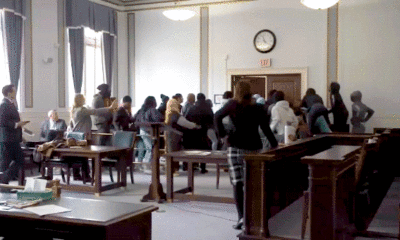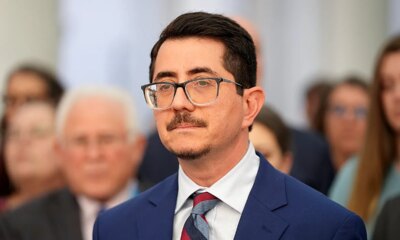Illinois
Trump weighs in on immunity for Illinois deputy in Sonya Massey murder

Trump weighs in on immunity for Illinois deputy in Sonya Massey murder
Former President Donald Trump appeared before the National Association of Black Journalists in Chicago on Wednesday where he was asked whether an Illinois deputy responsible for the fatal shooting of Sonya Massey is entitled to police immunity.
CHICAGO – Former President Donald Trump was questioned about his support for police immunity in connection with the Sonya Massey murder case during the National Association of Black Journalists’ convention in Chicago.
Massey, 36, was an unarmed Black woman who was fatally shot inside her Springfield home on July 6 after calling 911 for a possible intruder.
Former Sangamon County deputy Sean Grayson is accused of fatally shooting Massey as she was moving a pot of hot water off of her stove.
He is now charged with first-degree murder, aggravated battery with a firearm and official misconduct and is currently being held in the Sangamon County Jail, the Associated Press reports.
Sonya Massey murder: Illinois deputy allegedly shot woman in face after ordering her to move pot of water
Massey’s death has sparked outrage across the state of Illinois and has prompted many calls for justice, including in Chicago.
On Wednesday, Trump was asked by Semafor politics reporter Kadia Goba about immunity for Grayson.
This follows Trump’s claim that, if elected, police officers could be immune from prosecution.
Here is a breakdown of the conversation:
- Goba: “So, Sonya Massey, someone from Illinois, an unarmed Black woman, was shot the other day in her home by a deputy sheriff. The deputy has since been charged with murder. You said police would get immunity from prosecution if you win. Why should someone like that officer have immunity in your opinion?”
- Trump: “Immunity? I don’t know the exact case, but I saw something and it didn’t… it didn’t look good to me. Are you talking with the water, right?”
- Goba: “Police unions are not backing this person either.”
- Trump: “Are they going to be charging the officer? I guess they’re charging the officer?”
- Goba: “So why should he receive immunity?”
- Trump: “Well he might not. I mean it depends. It depends on what happens. I’m talking about people that are, much different cases than that. We need people to protect ourselves. By the way, in Chicago, as an example, a few weeks ago, July 4th weekend, we had 117 shootings and 17 deaths. Nobody wants that… We need to have our police officers have their respect and dignity back. In this particular case, I saw something that didn’t look good to me. I didn’t like it. I didn’t like it at all.”
- Goba: “So, can you get a little more specific back to the immunity question? Who would make those changes, those distinctions?”
- Trump: “For the most part, for the most part, people are protected by their unions, by their police unions or by their police departments. But I’m saying if I felt, or if a group of people would feel that somebody was being unfairly prosecuted because the person did a good job… or made a mistake, an innocent mistake. There’s a difference between being a bad person and making an innocent mistake. If somebody made an innocent mistake, I would want to help that person.”
- Goba: “What would those exceptions be?”
- Trump: “You go after somebody and it’s a very close call and it’s very dangerous. And you know… a policeman’s life, and woman, is a very difficult thing because sometimes you have less than a second to make a life and death decision. And sometimes very bad decisions are made. They’re not made from an evil standpoint but they’re made from the standpoint of they made a mistake.”
The conversation then shifts to Trump talking about being prosecuted and saying how he “won the big case” in Florida.
RELATED: Donald Trump speaks at NABJ convention in Chicago
On Tuesday night, Chicago residents and activists gathered at the New Mt. Pilgrim MB Church to call for action and justice in the case.
Massey’s father is also calling for the resignation of the Sangamon County Sheriff.
FULL SPEECH: Donald Trump speaks in Chicago to the NABJ
Donald Trump falsely questioned Kamala Harris’ race during an appearance before the National Association of Black Journalists in Chicago that quickly turned hostile on Wednesday.

Illinois
Illinois lawmakers consider tightening DUI law to 0.05 BAC

COLLINSVILLE, Ill. (First Alert 4) – Right now, in Illinois, Missouri and most of the country, drivers must be at or over 0.08 to get a DUI. A proposal in the Illinois Statehouse would lower that threshold.
“Make it as safe as you possibly can out there,” said John Sapolis.
Collinsville resident John Sapolis said while lowering Illinois’ DUI threshold would not affect him, as he rarely drinks, he likes the idea of getting drinkers off the road.
“It’s bad enough out there driving around with people who are not drinking,” said Sapolis.
If a bill passes in the Illinois House of Representatives, the blood alcohol limit would be lowered, meaning fewer drinks could put somebody over the line for a DUI.
Two Chicago-area lawmakers propose lowering the threshold from 0.08 to 0.05.
“Your body still is not in a proper state to really be behind the wheel,” said Erin Doherty, Regional Executive Director for Mothers Against Drunk Driving.
Doherty said even at 0.05, drivers are less coordinated and cannot track moving objects as well as when they are sober.
Utah is the only state in the country to have the 0.05 limit, and Doherty said one in five drivers there changed their behavior.
“There are so many other options before getting behind the wheel,” said Doherty.
Sara Floyd used to live in Utah and now calls Collinsville home.
“The Midwest people like to have a few beers while they watch their Little League games
“In Utah, you can barely get alcohol at a gas station,” said Floyd.
She said the culture in Utah is very different and thinks there should be some wiggle room for drivers.
“If one person had a beer within an hour period and then drove, they shouldn’t get a DUI for one drink,” said Floyd.
Doherty said they do not recommend driving even after a single drink.
“You really should not get behind the wheel when you’re any kind of impaired, one drink, five drinks, whatever that looks like, just don’t drive,” said Doherty.
While each body processes alcohol differently, according to the National Library of Medicine, in a two-hour period it takes a 170-pound man three to four drinks to reach 0.05, and it takes a 137-pound woman two to three drinks to reach the same state.
April Sage said she does not think this law would work, saying instead it would help more if the state added more public transit.
“I could have three beers and get a ride home safely,” said Sage.
First Alert 4 reached out to a spokesman for the Illinois Department of Transportation to see if they had any comments on this bill. The spokesperson said they are not going to comment because it is pending legislation.
According to the Illinois Department of Public Health, fatal crashes involving one driver who had been drinking increased 4% from 2019 to 2022, despite multiple studies showing fewer Americans are drinking.
Copyright 2026 KMOV. All rights reserved.
Illinois
Voters had no choice in nearly 9-in-10 primary elections

Illinois voting data shows voters had no choice of candidate in nearly 9-in-10 Democratic and Republican primaries for state and federal office in 2024.
Voters had no choice of candidate in nearly nine out of every 10 Republican and Democratic primary elections for state and federal office in 2024.
Analysis of Illinois voting data shows Democrats ran one or no candidate in 135 of the 155 primary elections for the U.S. House, Illinois Senate and Illinois House. That left voters with a choice between candidates in just 20 races.
Meanwhile, Republicans only ran one or no candidate in 137 of the 155 primary elections last year for non-judicial state and federal positions, giving voters of a choice in just 18 races.
In total, there were 155 primaries for the U.S. House of Representatives, Illinois Senate and Illinois House in 2024. Democrats did not run a candidate in 28 of these races while Republicans failed to run a candidate in 50.
And in the 107 Democratic primaries and 87 Republican primaries were only one candidate ran for the position, those candidates secured their spot on the general election ballot with a single primary vote.
To get on the primary ballot for Illinois Senate, the Illinois General Assembly mandates established party candidates to get 1,000 petition signatures from district party members. Illinois House candidates need 500 signatures. For U.S. House, either party’s candidates need signatures from 0.5% of all primary voters from their party in the district.
This lack of choice between candidates for Democratic and Republican party primaries also left general election voters with fewer choices on the ballot.
In the 2024 election cycle, 65 of the 155 non-judicial state and federal general elections had only one candidate on the ballot. That means in 65 districts, it only took one vote for a candidate to win a seat representing the entire district.
Illinoisans already suffer from a lack of choice in candidates. Research shows an average of 4.7 million Illinois voters had no choice in their state representative between the 2012 and 2020 election cycles.
Research shows more choice drives voter participation and makes legislators less susceptible to the influence of lobbyists and special interests. Lightly contested elections also tend to skew policies in favor of powerful special interests.
Illinois should consider reforms that will give voters more choices at the ballot box, such as making it easier for independents to enter the general election like they do in Iowa, Wisconsin and Tennessee.
Until that happens, Illinoisans will continue to see elections with too few choices and too much influence handed to those already in power.
Illinois
2 men shot, 1 fatally, outside bar in Morris, police say

MORRIS, Ill. (WLS) — A man was killed and another was injured in a shooting outside of a bar in Grundy County.
The shooting happened early Saturday outside of Clayton’s Tap in the 100 block of West Washington Street in Morris, Illinois, officials said.
ABC7 Chicago is now streaming 24/7. Click here to watch
The Grundy County Sheriff’s Office responded to the scene, where they found two men with gunshot wounds. One was pronounced dead at the scene and the other was taken to a hospital in critical condition.
The victim who died was identified by the Grundy County Coroner’s Office as 35-year-old Julian Rosario of Channahon.
A suspect in the shooting, 22-year-old Marshall Szpara of Seneca, was arrested and “initially charged with two counts of aggravated battery with a firearm, pending further review from the Grundy County States Attorney’s office,” Morris police said.
No further information was available.
Copyright © 2026 WLS-TV. All Rights Reserved.
-

 World6 days ago
World6 days agoExclusive: DeepSeek withholds latest AI model from US chipmakers including Nvidia, sources say
-

 Massachusetts6 days ago
Massachusetts6 days agoMother and daughter injured in Taunton house explosion
-

 Denver, CO6 days ago
Denver, CO6 days ago10 acres charred, 5 injured in Thornton grass fire, evacuation orders lifted
-

 Louisiana1 week ago
Louisiana1 week agoWildfire near Gum Swamp Road in Livingston Parish now under control; more than 200 acres burned
-

 Oregon4 days ago
Oregon4 days ago2026 OSAA Oregon Wrestling State Championship Results And Brackets – FloWrestling
-

 Technology1 week ago
Technology1 week agoArturia’s FX Collection 6 adds two new effects and a $99 intro version
-

 Florida2 days ago
Florida2 days agoFlorida man rescued after being stuck in shoulder-deep mud for days
-

 News1 week ago
News1 week agoVideo: How Lunar New Year Traditions Take Root Across America






















